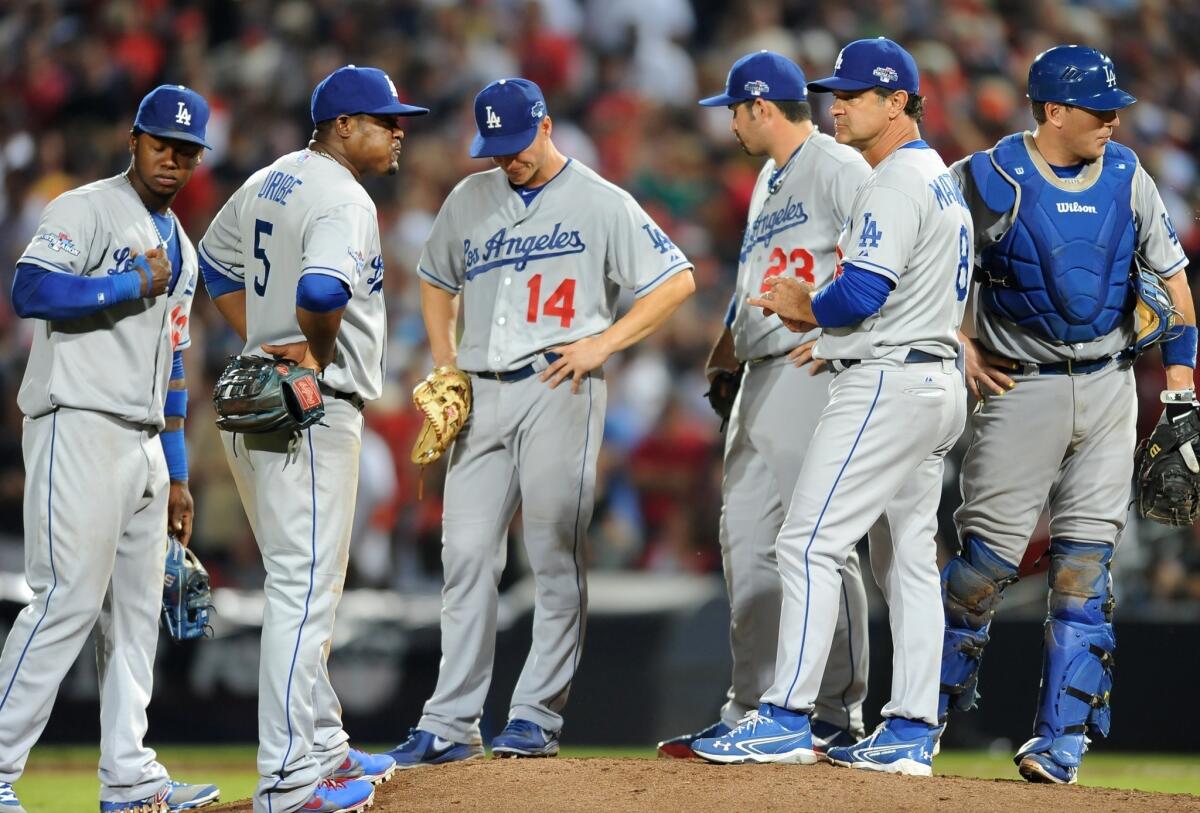Dodgers’ Don Mattingly’s margin for error just got smaller

- Share via
ATLANTA — He stared sullenly from the dugout as thousands of red-foam tomahawks were shaking above him.
He quietly shook his head at the field as ominous chanting echoed around him.
Later, in a cramped and still interview room, he spoke slowly about a sweaty Southern night during which the burden and blame of a frazzled defeat fell directly upon him.
Don Mattingly became Donnie Postseason Baseball on Friday, and it wasn’t pretty.
“Yeah, you always look back at everything, you could have did this, you could have did that,” said Mattingly with pained frankness. “So I think you look at it and you look at this honestly and see what you think.”
Honestly, the overwhelming thought is that Mattingly blew it during his Dodgers’ 4-3 loss to the Atlanta Braves in Game 2 of the now-knotted National League division series at Turner Field.
The thought is that Mattingly’s decision in the seventh inning to walk Reed Johnson and pitch to Jason Heyward — a strange move that was first-guessed by many — was the main reason the Dodgers lost a game they should have won.
Heyward’s two-run single up the middle against Paco Rodriguez gave the Braves a 4-1 lead that rendered moot a later two-run homer by Hanley Ramirez and forced a futile comeback attempt against nearly untouchable Braves reliever Craig Kimbrel.
“It’s really crazy,” said Mark Ellis, the calmest of sorts, in describing a game whose craziness flowed directly from a manager who doesn’t need this right now.
Mattingly is a beloved figure in the clubhouse, yet his late-game strategy is often questioned, and he was nearly fired earlier this season when the team was struggling. He is still working without a guaranteed deal for next year and, while the Dodgers hold an option, it is widely believed the team needs to play well in the postseason — and he needs to manage well under the October microscope — to ensure that option is picked up.
During an intense seventh inning Friday, Mattingly did not leave a good first postseason impression.
With the Braves leading just 2-1 and Dodgers reliever Chris Withrow pitching, the Braves’ Brian McCann led off with a walk, then Chris Johnson grounded a single into left field, moving pinch-runner B.J. Upton to second.
After Andrelton Simmons moved the runners up with a bunt, Elliot Johnson struck out for a second out, bringing up the pitcher’s spot in the batting order.
Up stepped left-handed pinch hitter Jose Constanza, so Mattingly played the numbers and went to left-handed reliever Paco Rodriguez, which may have been his first mistake.
“You always want to stay in there, that’s not my call, they probably had numbers on him,” said Withrow.
One number is that Constanza was hitless in eight at-bats against lefties this season. But the other number is that the weary Rodriguez had a 5.68 earned-run average in September and Withrow had seemingly found his focus.
The Braves immediately and understandably batted right-hander Reed Johnson for Constanza. Standing on deck was Heyward, a much more powerful hitter who bats left-handed. Mattingly immediately ordered Rodriguez to walk Johnson and face Heyward to get the valued lefty-lefty matchup.
First problem. A reliever is rarely brought into a game and immediately asked to throw four balls out of the strike zone. It messes with the rhythm he had just developed in the bullpen. It’s especially dangerous when the intentional walk loads the bases in this young reliever’s first playoff appearance
Second problem. A hitter like Reed Johnson is almost never walked for a hitter like Jason Heyward under any circumstances.
Johnson was hitting .244 with 11 runs batted in this season. Heyward has produced more runs than that since the All-Star break, a point after which he become the Braves’ catalyst with a .305 average with 17 RBIs.
And forget that left-lefty stuff. Heyward’s combined on-base and slugging percentage is actually 37 points better (.802) against lefties than righties (.765) this season.
It was a stunning move.
It was, then, not so stunning that an out-of-sync Rodriguez immediately threw Heyward two balls, then forced a fastball into
the strike zone that Heyward knocked into center field to score two runs that eventually proved decisive.
Afterward everyone tried to explain the decision, but nobody could really pull it off.
“We felt like Paco fits into Reed,” said Mattingly slowly, meaning Rodriguez pitches into Johnson’s strength. “[Rodriguez] is a guy we think gets Heyward out been getting those guys out all year long for us.”
One more number: While Rodriguez has indeed held lefties to a .131 average, he holds righties to a .202 average, so is it that much difference?
Said Rodriguez: “No question in that situation I would have liked to face the righty. [But] you have to go by the numbers.”
Said catcher A.J. Ellis: “I just kind of play the hand that I’m dealt, not my place to make the decision, these guys do a lot of work to find the right matchup, I’ll take Paco against any lefty.”
Like other missteps during Mattingly’s tenure, this one will disappear with a couple of wins. But if the Dodgers don’t get through this first round, this one could be like the sounds of all those Braves fans whooping into downtown Atlanta Friday night. This one could linger.
Twitter:@billplaschke
More to Read
Go beyond the scoreboard
Get the latest on L.A.'s teams in the daily Sports Report newsletter.
You may occasionally receive promotional content from the Los Angeles Times.











